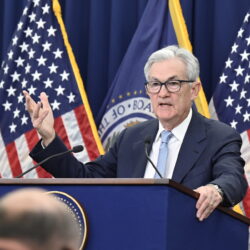
Inflation We Can Feel But Don’t Measure
“Regardless of whether one thinks that the CPI should include interest rates and/or asset prices, it seems clear that consumers factor in these costs when evaluating the cost of living.” ~Joshua R. Hendrickson
Monetary policy influences inflation, employment, and economic activity. A stable but dynamic monetary system is vital for supporting economic growth, individual liberty, and a prosperous society. Therefore, we examine the causes and consequences of monetary policy (including inflation), identify ideal and practical steps towards a better monetary policy regime, and look at monetary alternatives and financial regulation.
Cryptocurrencies, Blockchain, and Public Choice
RM Yonk, D Waugh
Cryptocurrency Concepts, Technology, and Applications, 2023
General Institutional Considerations of Blockchain and Emerging Applications
PC Earle, DM Waugh
The Emerald Handbook on Cryptoassets: Investment Opportunities and …, 2023
TL Hogan
OP-1793,'Principles for Climate-Related Financial Risk Management for Large …, 2023
TL Hogan
The Review of Austrian Economics, 1-4, 2022
War, money & economy: Inflation and production in the Fed and pre-Fed periods
TL Hogan, DJ Smith
The Review of Austrian Economics, 1-23, 2022
Book Review: Money and the Rule of Law: Generality and Predictability in Monetary Institutions
PC Earle
Quarterly Journal of Austrian Economics 24 (4), 2022

“Regardless of whether one thinks that the CPI should include interest rates and/or asset prices, it seems clear that consumers factor in these costs when evaluating the cost of living.” ~Joshua R. Hendrickson

“Central bankers are told that their domestic monetary policy obligations…must be balanced with or even subjugated to currency management practices that accommodate American exporters and competitors more broadly.” ~Mariana F. Trujillo and Peter C. Earle

“It is increasingly clear that the choice to stop rate hikes at the 5.25 to 5.50 policy rate range was at best premature and may ultimately prove insufficient.” ~Peter C. Earle

“We should focus less on who’s allowed to run the Fed and more on what the Fed’s allowed to do in the first place.” ~Alexander W. Salter

“Market participants continue to expect three cuts this year — and that those cuts will begin in the first half of the year. But they have adjusted the odds.” ~William J. Luther

“The unique value of Chancellor’s book, beyond tracing this intellectual history of interest and illustrating it by financial debacles up and down the centuries, is to connect the social and market outcomes with the broken money markets.” ~Joakim Book
250 Division Street | PO Box 1000
Great Barrington, MA 01230-1000
Press and other media outlets contact
888-528-1216
press@aier.org
This work is licensed under a
Creative Commons Attribution 4.0 International License,
except where copyright is otherwise reserved.
© 2021 American Institute for Economic Research
Privacy Policy
AIER is a 501(c)(3) Nonprofit
registered in the US under EIN: 04-2121305